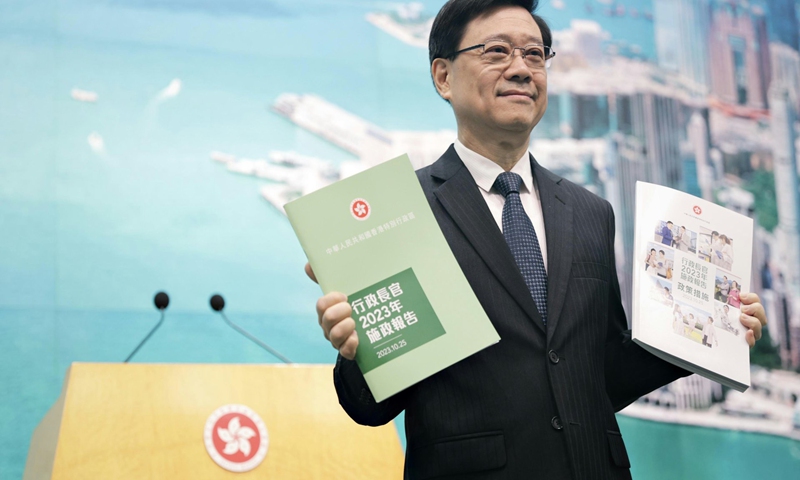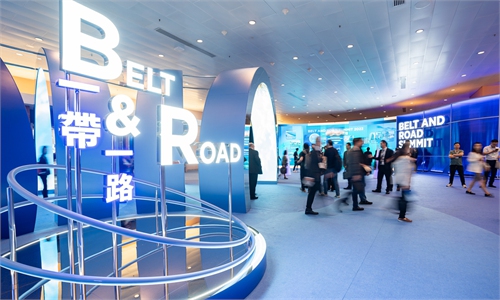Hong Kong to finalize legislation of Article 23 by 2024, set up patriotic education working group, John Lee says in policy address

The Hong Kong Special Administrative Region (HKSAR) government Chief Executive John Lee delivered the 2023 policy address on October 25,2023.Photo: Hong Kong media
The Hong Kong Special Administrative Region (HKSAR) government Chief Executive John Lee delivered the 2023 policy address on Wednesday at the Legislative Council with the core idea of implementing the One Country, Two Systems, developing economy and improving people's livelihoods. The city will also finalize the legislation of the Article 23 of the Basic Law within 2024.
Over the past year, the HKSAR government has led the city out of the pandemic with society fully returning to normal, Lee told at the policy address, which is his second policy address as the city's leader. Its green-colored cover also symbolizes Hong Kong's transition from stability to prosperity, Lee said.
In preparation for this policy address, Lee said he spent around three months engaging in consultation, holding over 40 sessions, and visiting various communities.
This year's policy address consolidated the past year's governance and introduced new areas and directions for the city's future development, the Chief Executive said.
The HKSAR government is fully committed to safeguarding national security and improving relevant legal systems and enforcement mechanisms.
Regarding the legislation of Article 23 of the Basic Law, local authorities are vigorously researching an effective legislative solution, aiming to fulfill the constitutional responsibilities of the HKSAR government and complete the legislation by 2024, Lee said.
Article 23 of the Basic Law stipulates that the HKSAR government shall enact laws on its own to prohibit any act of treason, secession, sedition or subversion against the central government.
In the face of escalating global cyberattack risks, the HKSAR government will focus on enhancing the protection of critical infrastructure, including energy, communication, transportation, financial institutions against cybersecurity threats. A legislative draft will be submitted to the Legislative Council by the end of 2024, Lee said.
The HKSAR government is also establishing a patriotic education working group to coordinate the work of government departments and non-governmental organizations in promoting national education, and to improve education concerning China's history, culture and current affairs.
Meanwhile, the territory's Leisure and Cultural Services Department (LCSD) will also establish a Chinese Culture Promotion Office, which will be tasked to plan and implement programs to promote Chinese culture and history. Starting next year, a Chinese Culture Festival will be organized for each year.
Hong Kong authorities will also establish the Hong Kong War of Resistance and Coastal Defense Museum next year, evolving from the existing Hong Kong Museum of Coastal Defense. The new museum will primarily showcase the history of the Chinese People's War of Resistance against Japanese Aggression, aiming to bolster national confidence and patriotic spirit.
China's top legislature on Tuesday voted to adopt the Patriotic Education Law, which is aimed at promoting the spirit of patriotism in the country.
Against this backdrop, the time is ripe for the promotion of patriotic education in Hong Kong, Lau Siu-kai, a consultant from the Chinese Association of Hong Kong and Macao Studies who is also a senior policy advisor, told the Global Times on Wednesday.
The Patriotic Education Law stresses supporting and upholding the Communist Party of China (CPC). Lau said for enhancing Hong Kong residents' understanding and respect for the Party, apart from deepening their awareness of the national conditions, it's imperative to strengthen their understanding and identification with the CPC, the People's Republic of China, and socialism with Chinese characteristics.
This is not just a requirement for local schools in Hong Kong but for the entire Hong Kong society. The HKSAR government and patriotic organizations should play a primary role, he noted.
The patriotic education relates to the successful implementation of the One Country, Two Systems, the long-term stability of Hong Kong, and the integration of Hong Kong into the national development strategy, experts said.
Hong Kong residents need to recognize their responsibilities in maintaining national security and national unity through patriotic education, which is essential to ensure that Hong Kong does not become a base for subversion, destruction, and infiltration, the senior policy advisor said.
In the latest policy address, Lee said Hong Kong has been transitioning from chaos to governance to prosperity. The National Security Law for Hong Kong fixed the loopholes of local national security legislation, improved the electoral system and prevented subversive elements of foreign agents from infiltrating local governance.
However, given the complex geopolitical situation, some countries, for their own interests, deliberately target China and hinder the successful implementation of the One Country, Two Systems in Hong Kong with some external forces continuing to interfering in Hong Kong affairs, the Chief Executive warned. Lee also cited some quotes from China's top official on Hong Kong and Macao affairs Xia Baolong, saying that "while the current situation in Hong Kong seems calm, there are underlying currents."
Everyone needs to remain constantly vigilant against the resurgence of urban violence, subtle disruptions termed "soft resistance," and anti-China forces spilling over from abroad, Lee warned.
Local government needs to guard against those who, through the internet and media channels, disguise themselves with social issues, attempt to stir up conflicts, distort facts, spread rumors, or employ seemingly plausible but distorted narratives to incite dissatisfaction among the public with the HKSAR government or even the central government, Lee said.
These are attempts at "soft resistance" against the governance of the central and SAR governments, he said.
Lee also pointed out during the policy address that local authorities will continue making efforts to strengthen training for all civil servants, enhancing their patriotic spirit and awareness of national security. The government will also initiate an exchange program with civil servants from other cities in the Greater Bay Area by the end of this year.


